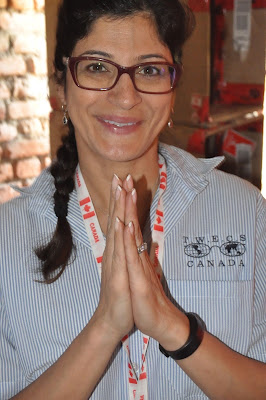As a Hindu-speaking Canadian, I never anticipated that one of my childhood languages would be a huge advantage in this predominantly Nepalese-speaking country. But to my surprise Hindi can be widely understood here, and I've often been able to facilitate complex interactions and connect with people in unexpected ways.
For instance, yesterday an octogenarian retired teacher came to our clinic at Shree Sangla Balkumari Secondary School, where she used to work. She had cataracts and very low vision, and though we couldn't entirely resolve her problem we were able to provide reading glasses to magnify her near vision, to help her with sewing and everyday tasks. She was able to understand my Hindi and communicate with me directly, instead of through our teenage interpreters. She was so thrilled that she wanted to do a song and dance for us! She proceeded to sing a traditional Nepalese song and do a choreographed routine. The rest of the clinic's patients joined in with the singing, and my colleagues Drs. Rita Messing and Allison Chang
A teenager came in, never having had glasses in her life, and required +8.00, a very high prescription. We gave her the strongest and most appropriate glasses available in our dispensary, and she left with much-improved vision and a huge smile on her face.
At Lalitpur, I examined 4-month-old baby whose mother said the baby had barely opened her eyes since birth. Her eyes were like slits and she had no vision we could discern. Heartbreakingly, the baby had been born with a hole in her heart and been given only 3 months to live. Without the money for private hospital care, this twenty-something mother had brought the baby to us in a desperate attempt for her child to perhaps see her mother's face at least once. This extraordinary tiny child and her hopeful mother had already defied the odds, but unfortunately I could do nothing to help them. At home in Canada, the baby would have received immediate post-party's care but the average Nepalese family has no recourse. I did give this woman some donated clothes from my own mother, just one moment in which I was reminded how lucky I am to have a supportive and generous family.
My own father and sister set aside CDN$600 for me to use for earthquake-relief donations on this trip, and with this support from my family and the TWECS team we were able to supply so much to help. We gave away probably 50 pairs of sturdy plastic slip-on shoes to shoeless kids and adults; more than 20 children's school backpacks; dozens of bars of soap; and 100 kg of rice and 15 kg of daal to an orphanage housing more than 50 children. I had packed two large suitcases full of clothing donations, including more than 50 brand-new t-shirts. I gave thise away at the orphanage and at our most remote clinic site, in the mountains at Kunchuk, where the school principal gratefully received them.
 |
| Dr. Michael Kellam helps give the shoes to the children in the orphanage |
 |
| Children in the orphanage take delight in seeing their photos. |
That 7-hour driving day in Kunchuk was, for me, the epitome of why I am here, on my third TWECS mission. It was apparent from the remoteness of that community and our warm reception there that few had ventured this far to provide post-earthquake relief. I am grateful to TWECS and its local host organization for making the extraordinary effort to get us there to do our work. It has been unforgettable.
Namaste by Dr. Annu Kaul
Sent from my iPhone







No comments:
New comments are not allowed.